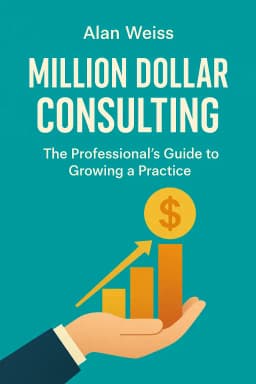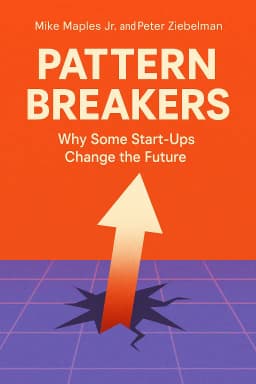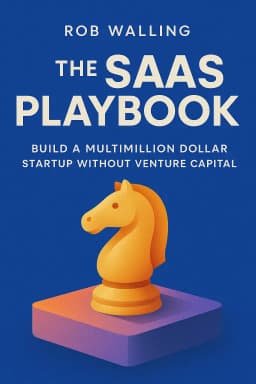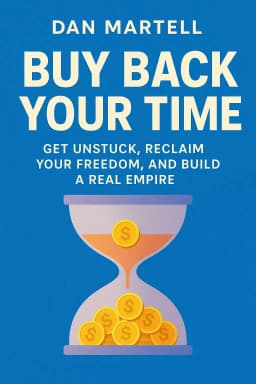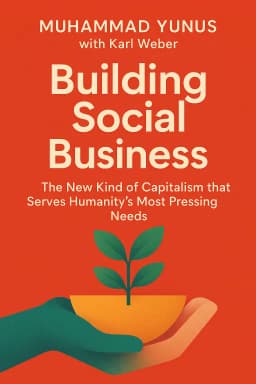
The Business of Zero
The New Kind of Capitalism that Serves Humanity’s Most Pressing Needs
Golden Hook & Introduction
SECTION
Mark: Alright, Michelle, quick pop quiz. What’s the total profit you’re allowed to make from a multi-million dollar business that’s solving world hunger? Michelle: Oh boy, a pop quiz to start. Let's see... knowing the world we live in, probably a disgustingly high amount, with some clever marketing about their 'social good' department. Mark: A very cynical, and usually correct, answer. But in this case, the answer, according to a Nobel laureate, is zero. Absolutely nothing. And that might be the most brilliant business idea of the 21st century. Michelle: Hold on. Zero profit? That’s not a business, that’s a charity. You’re telling me a company can be worth millions and the investors get nothing back? That sounds like a financial fairy tale. Mark: It sounds like it, but it’s very real. And it’s the core idea in the book we’re diving into today: Building Social Business: The New Kind of Capitalism that Serves Humanity’s Most Pressing Needs by Muhammad Yunus. Michelle: Ah, Muhammad Yunus. Now the 'Nobel laureate' part makes sense. He's the microcredit guy, right? The founder of Grameen Bank. Mark: Exactly. And this isn't just some academic theory he cooked up in an ivory tower. Yunus won the Nobel Peace Prize for putting these very ideas into practice. What’s incredible is that this global movement didn't start in a boardroom. It started when he lent just $27 of his own money to 42 people in a single village in Bangladesh. Michelle: Wow. Twenty-seven dollars. That’s less than I spend on coffee in a week. So how do you get from a tiny personal loan to a whole new vision for capitalism? What’s the actual, fundamental problem he’s trying to fix with this 'zero-profit' idea? Mark: That is the perfect question. Because to understand social business, you first have to understand Yunus’s diagnosis of what’s broken about the world we live in. He argues that poverty isn't an accident. It’s a design flaw in our economic system.
The Flaw in Capitalism's DNA: Redefining Human Motivation
SECTION
Michelle: A design flaw. That’s a bold claim. Most people would argue poverty is about a lack of resources, or education, or even individual motivation. He’s saying the whole system is built wrong? Mark: Precisely. He has this powerful quote where he says, "Poverty is not created by poor people. It is created by the system we have built." And the story that opened his eyes to this is almost painfully simple. In the 1970s, he was an economics professor in Bangladesh, surrounded by a devastating famine. He felt useless teaching elegant economic theories while people were starving outside his classroom. Michelle: I can imagine. It must feel incredibly disconnected from reality. Mark: Completely. So he started walking through the nearby village of Jobra, just to talk to people. And he met a woman named Sufiya Begum. She was making beautiful bamboo stools, but she was trapped in absolute poverty. He couldn't understand it. She was skilled, she was hardworking. Why was she so poor? Michelle: Okay, I'm hooked. Why? Mark: Because to buy the raw bamboo for her stools, she needed to borrow 5 taka. That’s about 7 cents in U.S. currency today. The only person who would lend her that money was a local trader. But the loan came with a condition: she had to sell all her finished stools back to him, at a price he alone decided. Michelle: Oh, that’s just predatory. He had her completely trapped. She could never get ahead. Mark: Never. After a full day’s work, her total profit was two pennies. She was essentially a slave to the moneylender, all for a loan of 7 cents. And Yunus was horrified. He found 41 other people in that same village trapped in similar situations. The total amount they needed to break free from the moneylenders? Twenty-seven dollars. Michelle: That’s infuriating. The fact that a few dollars stood between dozens of people and a life of dignity is just… staggering. Mark: It was a lightning bolt moment for him. He realized the problem wasn't the people. They were brilliant entrepreneurs. The problem was the system. The banks would never lend to them because they had no collateral, no credit history. The system was designed to exclude them. So, he paid the $27 out of his own pocket and freed them all. Michelle: And that was the seed for Grameen Bank. But it points to a much bigger idea, doesn't it? He’s saying that our entire economic theory is built on a faulty premise about human nature. That we’re all just selfish, one-dimensional profit-maximizers. Mark: Exactly. He argues that economic theory has created this fictional creature, the 'economic man,' who only cares about personal gain. But real human beings are multidimensional. We have selfishness, yes, but we also have selflessness, altruism, a deep-seated desire to help others. Traditional capitalism only harnesses one of those drives, and so it creates a lopsided, unequal world. Michelle: It’s a beautiful idea, and it resonates. But I have to bring up the criticism I’ve read. His legacy with microfinance is complex. Some studies, especially from places like India, have questioned whether it’s the poverty-ending cure-all it was once thought to be. Some even argue it can create new cycles of debt. Does he grapple with that tension? Mark: That's a fair and important point. The book focuses more on the next evolution of his thinking—social business—as a way to address the limitations of credit alone. He sees microcredit as one tool, but not the entire toolbox. He realized that even with access to credit, the poor still face huge problems: no access to healthcare, clean water, or nutritious food. The market just doesn't serve them. And that’s where the idea for a new kind of company came from. A company designed specifically to solve those problems. Michelle: So, a company that’s not a charity, because it has to sustain itself, but not a for-profit business, because its goal isn’t to make shareholders rich. It’s something entirely new. Mark: It’s a third category. And that’s the perfect bridge to his solution. It’s not about just giving aid; it's about building a whole new type of company. And the best example of this in action is the wild story of what happened when he teamed up with the French food giant, Danone.
The Social Business Blueprint: From Theory to Mud-and-Bricks Reality
SECTION
Michelle: Okay, Danone, the yogurt company. This feels like an unlikely partnership. A grassroots Bangladeshi banker and a massive European multinational. How did that even happen? Mark: It started with a simple conversation. Yunus met Franck Riboud, the CEO of Danone, and basically challenged him. He said, you’re a food company. Malnutrition is a huge problem in Bangladesh. Let’s create a business together to solve it. A social business. Michelle: And the CEO just said… yes? Mark: Riboud’s response was, "Let’s do it." Just like that. The idea was to create a company, Grameen Danone, to produce a nutrient-fortified yogurt for children in Bangladesh. They would call it Shokti Doi, which means "energy yogurt." The goal was to make it incredibly affordable, just 5 taka a cup, so even poor families could buy it. And, crucially, it would be a social business. Michelle: Meaning, non-loss, non-dividend. Danone would eventually get its initial investment back, but not a penny more in profit. Mark: Correct. All surplus would be reinvested to expand the business and reach more kids. They built a small factory in a rural area, sourced milk from local Grameen farmers, and hired local 'Grameen ladies' to sell the yogurt door-to-door. It was a perfect, self-contained ecosystem. Michelle: It sounds brilliant on paper. A virtuous cycle. So, it was a huge success right away? Mark: It was a near-total disaster. Michelle: Wait, what? Why? Mark: A couple of reasons. First, the 'Grameen ladies' sales network wasn't working. The women were hesitant, and sales were tiny. They had to learn a tough cultural lesson: you need to involve the whole family, especially the husbands, to make a venture like this work in a traditional community. But the real crisis came in 2008. Michelle: The global food crisis. Mark: Exactly. The price of milk, their main ingredient, skyrocketed. Suddenly, Grameen Danone was losing money on every single cup of yogurt they sold. The board had a huge debate. The Danone executives, trained in traditional business, said, "We have to raise the price. We can't be unsustainable." Yunus’s side argued, "If we raise the price, the poor can't afford it, and we fail our social mission." Michelle: That’s the core tension right there. The social mission versus financial reality. What did they do? Mark: They compromised and raised the price from 5 taka to 8 taka. And sales collapsed overnight. The rural sales network completely fell apart. Their customers vanished. It looked like the whole experiment was going to fail. Michelle: Wow. So this isn't a magic wand. You can't just slap the 'social business' label on something and expect it to work. It has to be a real, functioning business that can weather storms. Mark: It has to be at least as well-managed and creative as a for-profit business. And this is where the genius of the model showed up. They didn't give up. They went back to the drawing board. They realized their assumption about the yogurt size was wrong. They reformulated the product into a smaller, 60-gram cup that they could sell for 6 taka. It was still more expensive than the original, but much more affordable than the 8-taka version. Michelle: And they found a way to make it work financially? Mark: This is the clever part. They started selling the yogurt in the big city, Dhaka, to wealthier customers at a higher price. They used the profits from the urban market to subsidize the lower price in the poor, rural areas. Michelle: Cross-subsidization! So the rich customers are essentially, and probably unknowingly, helping to fund the social mission through their yogurt purchase. That’s a really elegant solution. Mark: It’s incredibly elegant. And it gets to the heart of what makes a social business different. It’s not about maximizing profit; it’s about finding a sustainable model to maximize impact. But my favorite detail from this whole story addresses your earlier question: who on earth would invest in this? Michelle: Yeah, I’m still stuck on that. Why would Danone’s shareholders agree to a 'non-dividend' company? It goes against everything they’re taught. Mark: Well, Danone created a special fund, Danone Communities, for employees and investors who wanted to support this kind of project. But initially, the agreement included a symbolic 1 percent dividend for the investors. Later, at a board meeting, the Danone team proposed to amend the agreement and eliminate that 1 percent dividend entirely, making it a pure, zero-dividend social business. Michelle: And everyone agreed? Mark: Everyone celebrated. Someone at the meeting remarked, "This is the first time in business history that owners are celebrating because a dividend payment has been waived!" It proves Yunus's point: people are motivated by more than just money. They are also motivated by meaning.
Synthesis & Takeaways
SECTION
Michelle: That story is fantastic because it’s not a simple success story. It’s messy. They made mistakes, they almost failed, and they had to get incredibly creative to survive. It feels much more real and, honestly, more inspiring because of the struggle. Mark: It does. And it shows that social business isn't about being 'soft'. It requires incredible business rigor, cultural sensitivity, and a willingness to adapt. You have to be pragmatic. Michelle: So it seems the big idea here isn't just about helping the poor with yogurt or water. It's about fundamentally rewiring our definition of 'value' in business. We're so conditioned to measure success in dollars and cents, in profit margins and shareholder returns. But Yunus is proposing a parallel system, a whole other stock market of value, measured in problems solved and lives changed. Mark: That’s a perfect way to put it. He’s not saying we should abolish traditional capitalism. He’s saying it’s incomplete. It’s a single-engine airplane. By adding the second engine of social business—one that runs on our selfless, creative, problem-solving impulses—we can build a system that can actually take us where we want to go. Michelle: A world without poverty. He genuinely believes it’s possible. Mark: He believes it’s not only possible, but that we already have all the tools we need. He points to projects with companies like BASF, using their dormant patents for mosquito nets to fight malaria, or Adidas, working on a one-euro shoe so no child has to go barefoot. The technology and resources exist. The problem has always been the business model, the operating system. Social business is his proposal for a new OS. Michelle: It really leaves you with a powerful question, doesn't it? It’s easy to critique the system, but he’s actually building an alternative. Mark: And it makes you think. It leaves you asking yourself a really profound question: If you had the resources of a big company, or even just your own skills and a bit of capital, what social problem would you try to solve? Not for profit, but just because it needed solving. Michelle: That's a fantastic question for our listeners. And it doesn't have to be a huge global issue. It could be something in your own community. We'd love to hear your ideas. Drop us a comment on our socials. What's your social business idea? Mark: I love that. Let’s see what the Aibrary community comes up with. Michelle: This has been fascinating, Mark. A really hopeful and challenging perspective. Mark: It’s a game-changing idea. Thanks for exploring it with me, Michelle.

